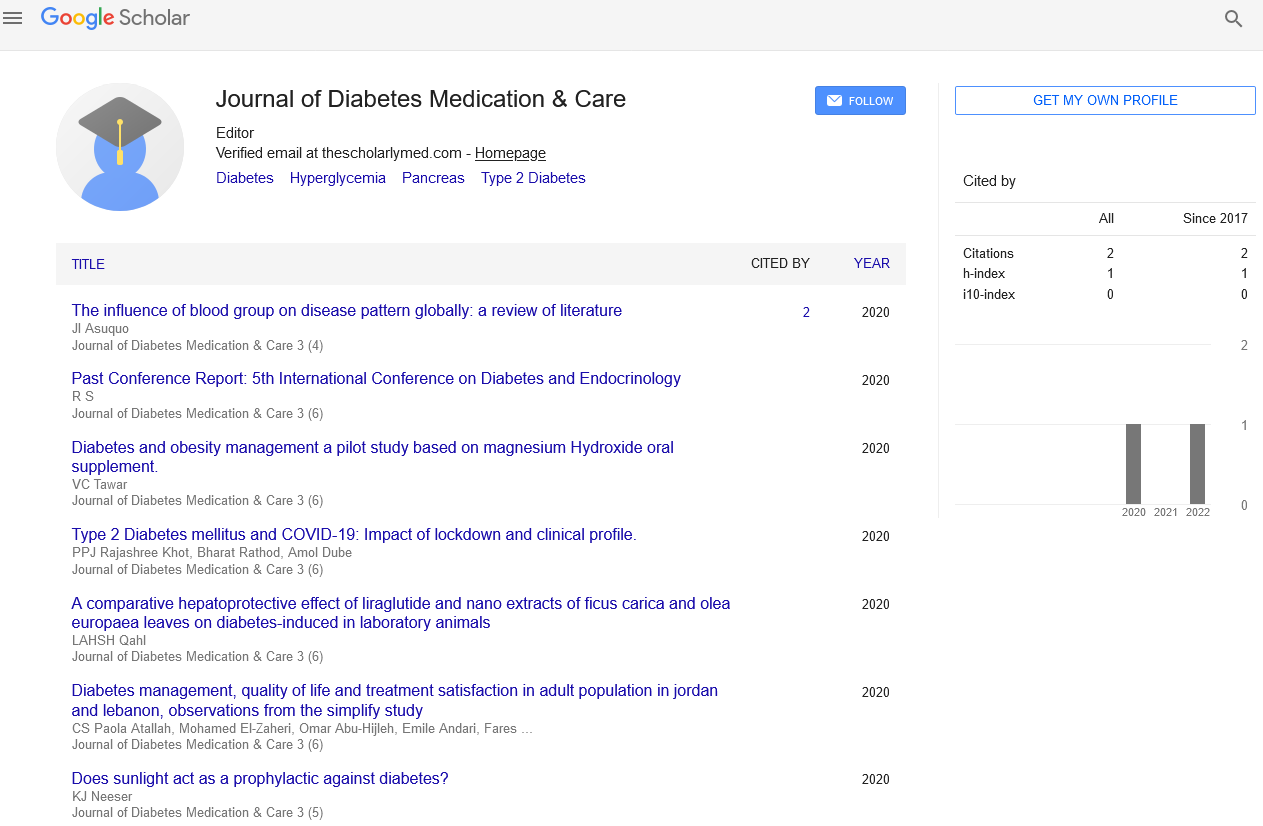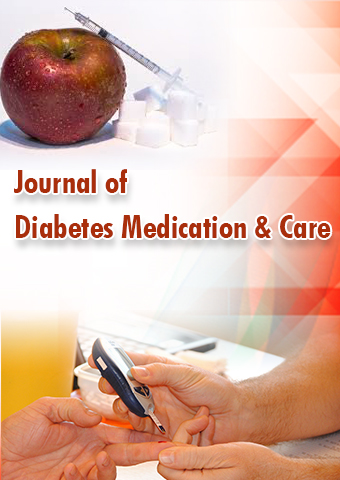Perspective - Journal of Diabetes Medication & Care (2024) Volume 7, Issue 1
Transforming Lives: Therapies and Lifestyle Changes for Diabetes Management
- Corresponding Author:
- Josha Neumiler
Department of Endocrinology, University of Freiburg, Freiburg, Germany
E-mail: jneumiler@wiu.edu
Received: 02-Jan-2024, Manuscript No. JDMC-24-126489; Editor assigned: 05-Jan-2024, PreQC No. JDMC-24-126489 (PQ); Reviewed: 19-Jan-2024, QC No. JDMC-24-126489; Revised: 26-Jan-2024, Manuscript No. JDMC-24-126489 (R); Published: 05-Feb-2024, DOI: 10.37532/JDMC.2024.7(1).180-181
Introduction
Diabetes, a chronic metabolic disorder affecting millions worldwide, demands a holistic approach for effective management. While medications play a crucial role, therapies and lifestyle changes are equally pivotal in empowering individuals to lead healthier lives. In this comprehensive guide, we delve into various therapeutic modalities and lifestyle adjustments that can positively impact diabetes management.
Description
Therapeutic approaches
Medication adherence: The cornerstone of diabetes management often involves medications, such as insulin, oral hypoglycemic agents, or other injectables. Adhering to prescribed medication regimens is vital for maintaining blood glucose levels within the target range. Regular communication with healthcare providers to discuss any concerns or side effects is key to optimizing medication efficacy.
Continuous Glucose Monitoring (CGM): In recent years, technology has revolutionized diabetes management with the advent of Continuous Glucose Monitoring (CGM) systems. These devices provide real-time data on blood glucose levels, allowing individuals to make timely adjustments to their treatment plans. CGM systems empower patients and healthcare providers with actionable insights, enhancing overall diabetes control.
Insulin pump therapy: For those requiring insulin, insulin pump therapy offers a more flexible and precise approach to insulin delivery. These devices provide a continuous supply of insulin, mimicking the natural release of insulin by the pancreas. Insulin pump therapy allows for customized insulin dosing, reducing the risk of hypoglycemia and offering greater convenience for users.
Bariatric surgery: In cases of severe obesity and uncontrolled diabetes, bariatric surgery may be considered as a therapeutic option. This surgical intervention has been shown to improve insulin sensitivity and promote significant weight loss, leading to remission of diabetes in some cases. However, the decision to undergo bariatric surgery should be carefully weighed with potential risks and benefits.
Lifestyle changes
Nutritional therapy: A well-balanced diet is the foundation of diabetes management. Nutritional therapy focuses on maintaining a healthy balance of macronutrients–carbohydrates, proteins, and fats–while considering the glycemic index of foods. Portion control, regular meal timing, and the inclusion of nutrient-dense foods are crucial elements in stabilizing blood glucose levels.
Physical activity: Regular exercise is a powerful tool in diabetes management. Physical activity helps improve insulin sensitivity, lower blood glucose levels, and manage weight. Incorporating a combination of aerobic exercises, strength training, and flexibility exercises into a routine can yield significant benefits. It is essential to choose activities that align with individual preferences and health conditions.
Stress management: Stress can adversely impact blood glucose levels by triggering the release of stress hormones. Implementing stress management techniques such as mindfulness, meditation, deep breathing exercises, and yoga can help stabilize blood glucose levels. Creating a balance between work, leisure, and relaxation is essential for overall well-being.
Adequate sleep: Quality sleep plays a vital role in metabolic health and diabetes management. Sleep deprivation can disrupt insulin sensitivity and increase cravings for unhealthy food choices. Establishing a consistent sleep routine, creating a comfortable sleep environment, and addressing sleep disorders are critical components of a diabetes-friendly lifestyle.
Complementary therapies
Acupuncture: Traditional Chinese medicine, including acupuncture, has gained recognition for its potential in diabetes management. Acupuncture may help regulate blood glucose levels by stimulating specific points related to organ function and energy flow. While more research is needed to establish its effectiveness, some individuals report positive outcomes with regular acupuncture sessions.
Herbal supplements: Certain herbs and supplements, such as bitter melon, fenugreek, and cinnamon, have been explored for their potential antidiabetic effects. It’s important to approach herbal supplements with caution, as their efficacy can vary, and interactions with prescribed medications may occur. Consulting with a healthcare professional before incorporating herbal supplements is advisable.
Mind-body therapies: Mind-body therapies, including biofeedback, guided imagery, and relaxation techniques, can contribute to stress reduction and improved emotional well-being. These approaches complement traditional medical interventions and empower individuals to actively participate in their diabetes management.
Personalized approach
The effectiveness of diabetes therapies and lifestyle changes is inherently linked to individualized care. Each person’s response to treatments and lifestyle adjustments may vary based on factors such as genetics, coexisting health conditions, and personal preferences. Therefore, a personalized approach, involving close collaboration between individuals and their healthcare team, is crucial for achieving optimal results.
Conclusion
Diabetes management goes beyond medications and encompasses a multifaceted approach that includes therapies and lifestyle changes. Embracing technological advancements, adopting healthy habits, and exploring complementary therapies can empower individuals to take control of their diabetes journey. By fostering a collaborative relationship with healthcare providers and making informed choices, individuals can transform their lives and pave the way for a healthier, more vibrant future despite living with diabetes.

